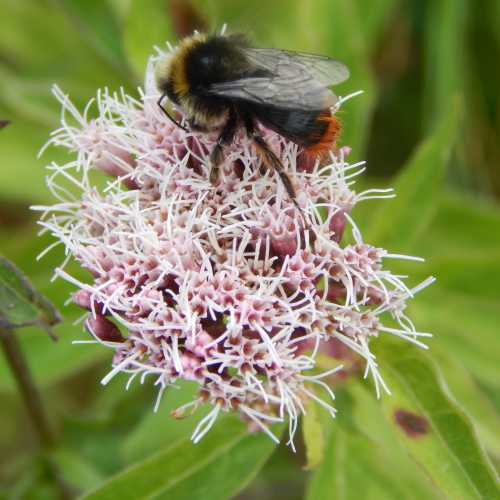Bumblebees For Sale?
There are commercially reared bumble bees for sale
not only available to farmers and growers, but also for gardeners. These days,
in the UK for example, one can sometimes see boxes of bumblebees for sale in advertisements
in gardening magazines and you can buy bumble bees from on-line stores.
If you are thinking of purchasing a box of bumble bees for your garden, please read this first.
Potential risks of commercially reared bumble bees?
Research has shown commercially reared bumble bees may be contaminated with contagious viruses and diseases
In a study: The Trojan hives: pollinator pathogens, imported and distributed in bumble bee
colonies by Peter Graystock et al, (publ. Jul 2013, Journal of Applied Ecology)(1); scientists found that bumble bees reared for commercial sale in many cases, were carrying pathogens.
In summary:
- Scientists used molecular methods to examine the occurrence of
parasites in bumble bee colonies that were commercially produced in 2011 and
2012 by three producers. They then used controlled experiments to
determine whether any parasites present were infectious.
- They found that 77% of the commercially
produced bumble bee colonies from the three producers, which were imported
on the basis of being free of parasites, in fact carried microbial parasites,
with five different parasites being detected across the total sample of
bumble bees, and a further three in the pollen supplied with the colonies as
food.
Their experiments demonstrated that at least three of these parasites were infectious to bumble bees with significant negative effects on their health. Furthermore, at least four of the parasites carried by commercially produced bumble bees were infectious to honey bees, indicating that they may pose a risk to other pollinators as well. - Over a million commercially produced bumble bee
colonies are imported annually on a global scale for the pollination of
greenhouse crops. After importation, they interact with other pollinators,
with an associated risk of any parasites they carry infecting and harming
native bees.
- They conclude: The results demonstrate that commercially produced bumble bee colonies carry multiple, infectious parasites that pose a significant risk to other native and managed pollinators. More effective disease detection and management strategies are urgently needed to reduce the pathogen spillover threat from commercially produced bumble bees.
This begs the question:
Are the bumble bees for sale in garden centres, in magazines, and available on line, potentially already infected with diseases that put wild species at risk?
National and supranational regulations are supposed to
prevent this, and commercially produced bumblebee colonies are accordingly,
now often sold and imported as being parasite-free, but it's looking like the system is not working.
Further comment on the study by the University of Leeds states:
“The team
bought 48 colonies of buff-tailed bumblebees (Bombus terrestris) from three
European producers. Some colonies were a subspecies native to the UK and others
were non-native. All were meant to be disease-free, but when they were tested
using DNA technology, 77% of the colonies were found to be carrying parasites.
Parasites were also found in the pollen food supplied with the bees.........
.....The results suggest current regulations and
protocols governing bumblebee imports are not effective. Currently, Natural
England licences are only required for the non-native subspecies. Although the
licences require colonies to be disease free, colonies arriving in the UK are
not screened to ensure compliance and the regulations do not apply to imports
of the native subspecies."(2)
To an extent, the findings of this study are perhaps no surprise, given the results of a study back in 2010, carried out by the Department of Entomology, The Pennsylvania State, USA.....
THIS ARTICLE CONTINUES ON THE NEXT PAGE
Sources of information:
(1) http://onlinelibrary.wiley.com/doi/10.1111/1365-2664.12134/abstract
(2) http://www.leeds.ac.uk/news/article/3421/
bees_under_threat_from_trojan_hives
If you found this page helpful or interesting, I'd really be grateful if you would share it with others - if not this page, perhaps another, such as Gardening For Bees.
Thank you so much :) .
